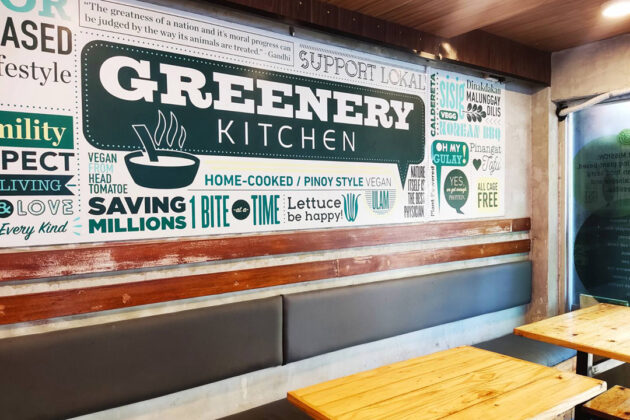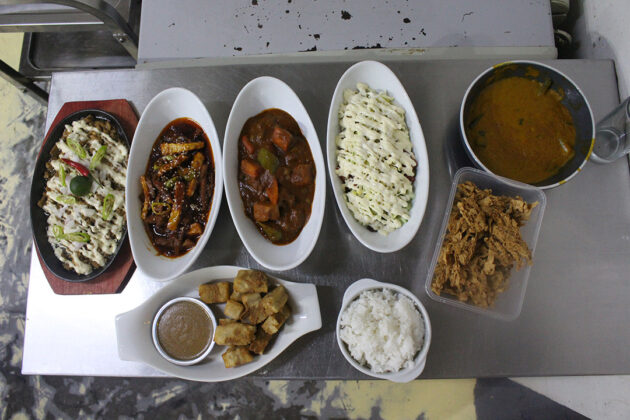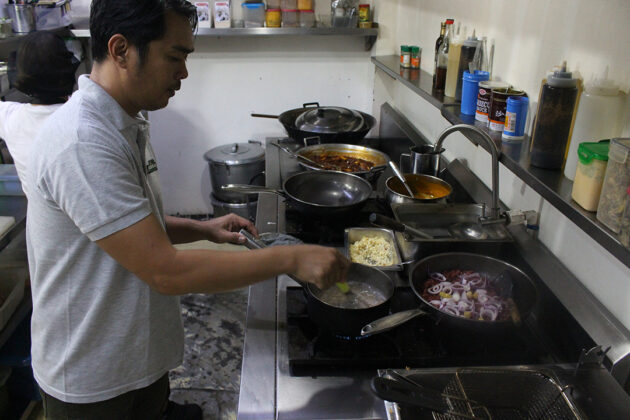Greenery Kitchen sees rise in plant-based food demand
By Patricia B. Mirasol, Multimedia Producer
ENTREPRENEURS in the Philippines may find opportunities in catering to shifting consumer preferences towards plant-based options, according to vegan restaurant Greenery Kitchen.
Consumer demand for healthier and sustainable food choices is contributing to the growth of the plant-based food market, said Edilberto Villamor, co-owner of Greenery Kitchen.
A chef who is creative with vegan food can satisfy even the most omnivorous palates, he said in an interview with BusinessWorld.
“That’s our motivation actually, ’yung ma-meet namin ’yung hanap nila sa meat (That’s our motivation actually, to meet their expectations for meat),” he said.
“Ano ba ang taste ng kaldererta? Hindi ko siya ilalabas sa kitchen kung hindi siya at least maglalasang regular kaldereta…hindi ko ilalabas ’yung sisig kung hindi siya lasang regular sisig (What does kaldereta taste like? I won’t bring it out of the kitchen unless it tastes like regular kaldereta… I won’t serve the sisig if it doesn’t taste like regular sisig),” he added.
About two million Filipinos were vegetarians in 2021, representing 5% of the population, as reported by the London-based market research company Euromonitor in 2022.
The Philippines’ consumption of non-meat food reached $68.9 million in 2021, with the sector’s compound annual growth rate growing by 4.3% from 2016 to 2021, it also said.
Data from Mintel Group Ltd. in 2022 showed that 149 plant-based meals were launched in the Philippines between 2017 and 2021. Dairy, snacks, processed fish, meat, and egg products were the top categories of the released plant-based meals, according to the global market intelligence and research agency.
Low or reduced allergen, plus no additives or preservatives, were the top claims associated with the plant-based meals released during the period, it said.
CUSTOMERS
Most of Greenery Kitchen’s customers are non-vegan, according to Mr. Villamor.
“A majority of our clients are non-vegan, or non-vegetarian,” Mr. Villamor said.
“These are people na nakatikim ng vegan fare, or nakapanuod ng mga vlogs. ’Yung mga regular vegan practitioners talaga na clients namin, konti lang sila (These are people who have tasted vegan fare, or have watched vlogs. The regular vegan practitioners who are our clients, they are just a few),” he added.
Veganism is a lifestyle that excludes meat and all animal-based products. Vegetarianism, in contrast, still allows for animal-based products like eggs, dairy, and cheese.
According to Ivy Villamor, Mr. Villamor’s wife who helps run the restaurant, the largest segment of their customers consists of women aged between 24 and 44 years old.
“The next big chunk of our customer demographics are senior citizens between 60-65 years old,” she said. A majority give their food a go for health reasons, “and we are really happy that they try our plant-based options.”
CHALLENGES
The main challenges in running a business include supply chain and pricing concerns, Ms. Villamor said.
It is difficult to keep meal prices low, and cover other expenses, especially with inflation, she added.
“Kung mas mura ang plant-based, mas maa-appreciate ng mga tao… as it should be, kasi lahat ng pagkain natin, kaya natin i-source sa palengke (if plant-based foods are cheaper, people will appreciate them more… as it should be, because we can source all our food from the market),” she said.
Complying with government requirements and overhead also eats up into the profit margin, she added.
The Villamors cut costs by sourcing their supplies from local markets.
“We look for the cheapest but nicest suppliers,” Ms. Villamor said. “We also make our own in-house, plant-based meat alternatives.”
LOOKING FORWARD
The business was started as a delivery service in 2006 by the couple to spread their advocacy for plant-based living.
They now average about 100 à la carte packs Monday through Saturday, serving their market both through their in-house delivery service and through food delivery apps.
Rice meals from the restaurant, which opened in 2016, are likewise available at Caffe Te Ree Ya in NAIA Terminal 3.
“We’re also looking for resellers,” Ms. Villamor said.
“We want to promote peace, starting with our plate,” Ms. Villamor added.
“How can we ask people to turn plant-based if hindi namin ipapakita kung paano? Kaya in-offer namin ’yung food ngayon, for anyone who wants to try (How can we ask people to turn plant-based if we don’t show them how? That’s why we offered the food now, for anyone who wants to try).”






